Brief: This article shows you the list of best privacy-focused Linux distributions. This article is intended for readers who are extremely concerned about their only privacy.
Privacy is a serious and much-debated issue. In this age of cyber espionage and electronic surveillance, privacy becomes a crucial subject.
While most of us Linux users care about our privacy to an extent, some people take it to an ‘extreme level’. Such people are often termed ‘privacy freaks’ (not in a derogatory manner).
The good thing about Linux is that it has got a distribution for (almost) everyone’s needs. Privacy is not an exception. There are Linux distributions specifically focused on privacy. These privacy-focused Linux distributions provide you with tools and configurations to escape electronic surveillance, hide your digital footprints and retain your anonymity from advertisers, data gatherers, etc.
Best privacy-focused Linux distributions
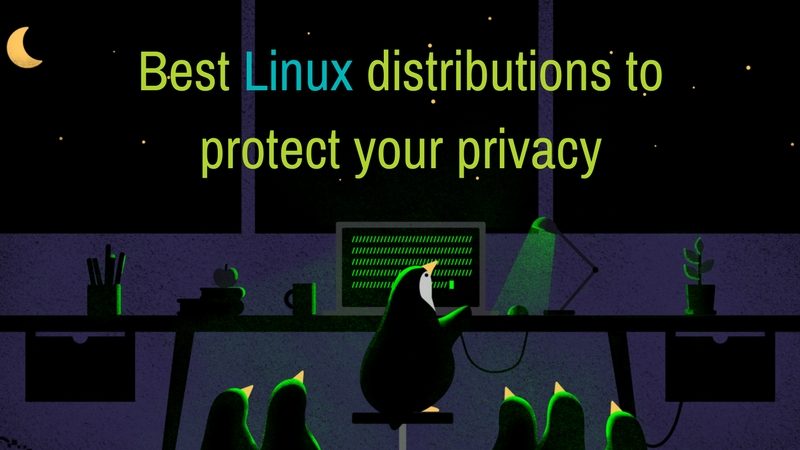
Now, I am not going to tell you why you should care about your privacy. I am also not going to show you how to stay anonymous online. You can choose to utilize our actionable guide on using Tor to enhance privacy
But, I leave that decision to you if you want to go to the length of using a dedicated Linux distribution for privacy.
In case, you have already made up your mind or just being curious about it, here are the best secure Linux distros.
1. Tails
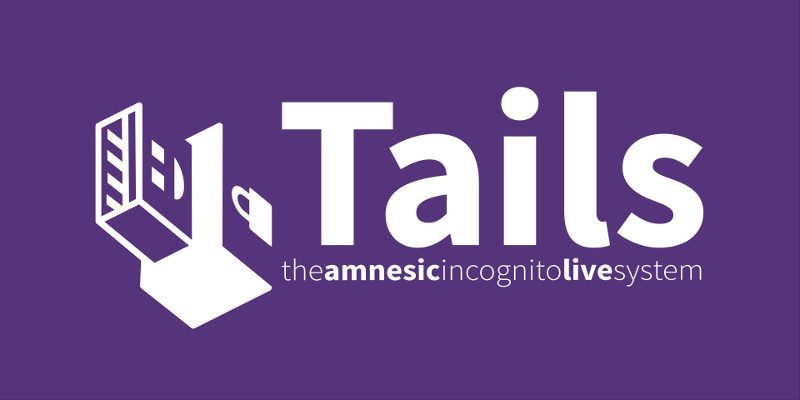
Tails is a live Linux distribution that has been created with one thing in mind, privacy. You can put it up on a DVD, USB key or SD Card and use it as a live system on any computer. You can even upgrade the live USB or disk to a newer version.
The thing with Tails is that it doesn’t store anything locally. Your activities die as soon as you boot off the system.
Apart from that, Tails provide you complete anonymity with a pre-configured Tor browser. This helps you to stay anonymous on the internet and circumvent censorship.
Tails also has a long list of pre-installed privacy software. You can see the entire list here.
2. Whonix

Whonix is another popular Tor based Linux system. It is actually a heavily reconfigured Debian Linux that is designed to run inside a virtual machine.
The virtual machine provides a sandbox that keeps your actual system (also called host system) safe.
What separates Whonix from running any Linux system in VM is that the entire traffic from Whonix VM is ‘Torified’. In other words, it uses Tor protocol for accessing internet. Which means that your connection is ultrasecure and encrypted.
This picture might help you understand its functioning.
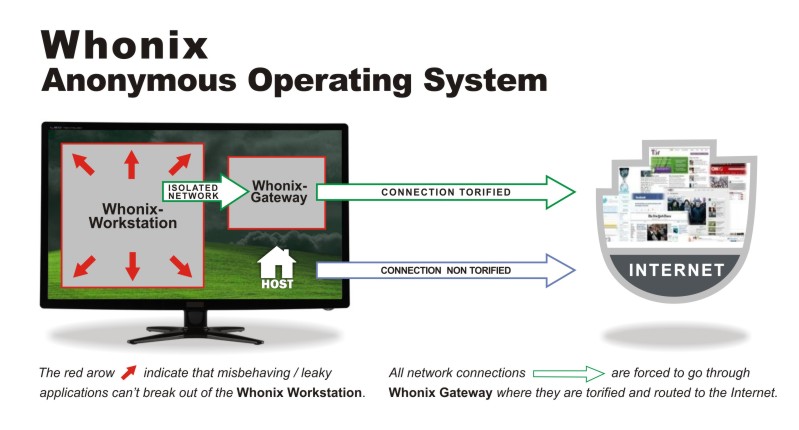
Best thing about Whonix is that you can use it inside any other operating system, be it Linux or Windows or MacOS.
3. Qubes OS

Qubes OS comes with a compartmentalization feature. It is based on Fedora.
Compartmentalization offers exceptional privacy. Because, whenever you run a program in this OS, it places them in an isolated virtual environment and once you close the program, no one will ever be able to find out the session data.
You would want a system with at least 16 Gigs of RAM and a decent processor to make use of it easily.
Qubes OS makes use of the RPM package manager and can run on almost any hardware. This distro is being upheld by online privacy activists for many years. Even whistle-blower Edward Snowden said that it is the “best OS available today“. If you want absolute anonymity and if you want to keep your data to yourself whether offline or online, this is the OS you want.
Qubes also comes with full-disk encryption by default and users can configure or personalize their encryption parameters according to their needs. This guarantees that data is always secured between sessions.
3. IprediaOS
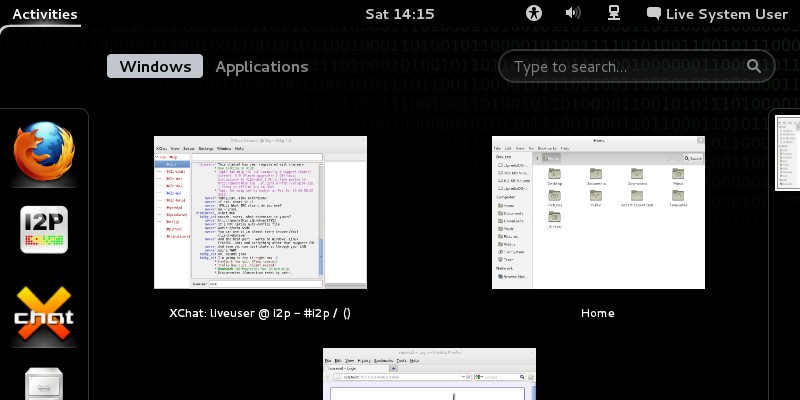
Note: IprediaOS is no longer maintained. Also, you may not be able to download it from the official source.
Unlike the above two, Ipredia was NOT based on the Tor protocol. It utilized I2P (Invisible Internet Project) protocol which provides an anonymous web connection, the same as Tor. I2P is heavily linked to the dark net.
IprediaOS was a Fedora-based Linux distribution with GNOME desktop environment. It can be used as a live USB or installed on a hard disk.
It came preinstalled with anonymous email, bit torrent, and IRC clients to provide you an anonymous internet experience.
The biggest drawback of IprediaOS was that it can only be used to browse i2p sites. You did not have the ability to browse normal websites on Ipredia OS.
4. Discreete Linux
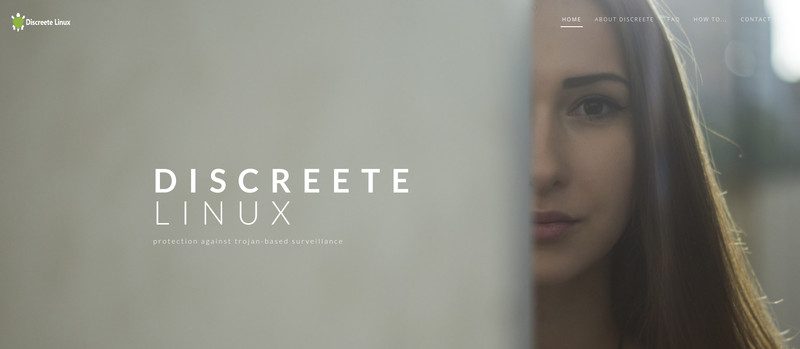
Note: No longer developed/maintained but you can still find the ISO file to try it out.
Formerly known as Ubuntu Privacy Remix, Discreete Linux is based on Debian Linux. It aims to give professional-grade privacy to people without deeper computer knowledge.
Like Tails, Discreete Linux can also be used only as a live operating system. So you can put it on an external disk, USB or SD Card and use it as a live system.
Discreete Linux is a read-only system meaning that after every reboot, your system is in the same state as it was at the first use. This way even if a surveillance software was installed in one session, it cannot be continued in the next session.
Perhaps it is one of the most user friendly privacy focused Linux distribution in this list.
5. Mofo Linux
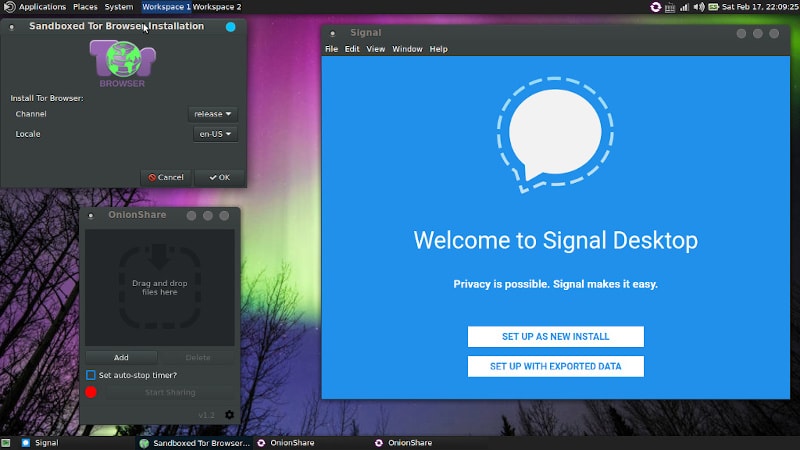
Mofo (yes, the same street slang) is a privacy-focused Linux distribution to help you escape electronic surveillance. It is built on top of Ubuntu with the MATE desktop environment.
Mofo Linux is basically Ubuntu with plenty of privacy tools installed and configured by default. You can learn more about it in our separate article on MOFO Linux.
If you already use Ubuntu, Mofo could be a familiar choice.
6. Subgraph OS (in alpha stage)
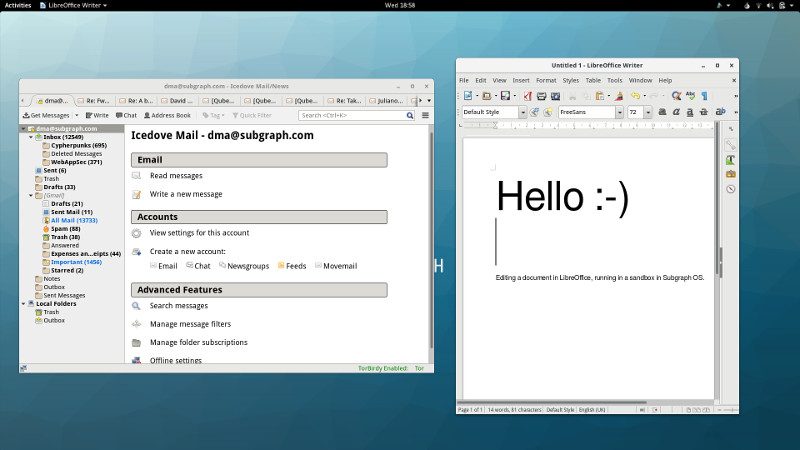
Note: It isn’t actively maintained anymore.
Subgraph OS is a work in progress by open source security company Subgraph.
Subgraph uses Tor to provide anonymity. It also has its own secure email client and instant messenger. To provide an extra layer of security, it uses sandboxing of applications so that the system itself is not impacted.
Subgraph OS uses a modified Linux kernel with enhanced security. File system encryption is mandatory here.
What’s your pick?
To be honest, I don’t use any of these privacy Linux distros. What about you? Are you concerned about your privacy enough to use any of these Linux?

